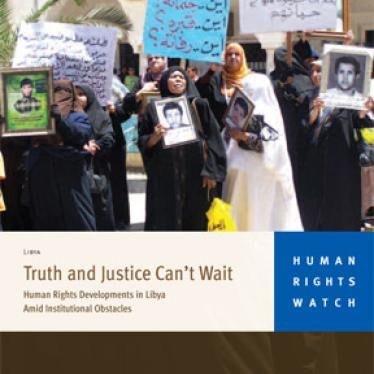(New York) - Libya's Internal Security agency should comply immediately with judicial orders ordering the release of the 330 prisoners the agency is detaining without any legal basis, Human Rights Watch said today.
Human Rights Watch raised the subject with Libyan security officials following a news conference on human rights abuses in Tripoli, the Libyan capital, on December 12, 2009. The continued detention of prisoners who have been acquitted or whose sentences have expired was one subject of the discussions.
"Both Libya's justice secretary and the head of its internal security agency have confirmed to us that there is no legal basis to hold these people," said Sarah Leah Whitson, Middle East director at Human Rights Watch. "The security forces are basically trying to substitute their own judgment for that of the country's courts."
In a meeting with Human Rights Watch on December 12, the head of internal security, Colonel Al-Tohamy Khaled, confirmed that his agency was detaining 330 prisoners whose sentences had ended or who had been acquitted in Abu Salim prison. He said his agency believed the men were a security risk because of their Jihadist views, and the judges who had ordered their release "did not understand" the situation, in some cases acquitting them on technical procedural grounds. "The law is something traditional" but his agency "understands reality," he said.
Colonel Khaled also said that at least 150 of the men had been captured fighting in Iraq or had been returned to Libya by Egypt and Syria on their way to Iraq. He said that in many cases, at the request of their parents, the men were in a mandatory "rehabilitation" program to persuade them to give up their extremist views. He said the program would help reintegrate them into society and find jobs and housing when released. He said he was confident that 193 of the men would be rehabilitated and released "within two to three weeks."
Some of the men involved were acquitted in March 2008, or had sentences that ended in early 2009. Libyan law does not provide for preventive detention, nor does it allow security agencies to continue to detain prisoners on grounds of national security.
The justice secretary, in discussions with Human Rights Watch, confirmed that the Office of the General Prosecutor had ordered the release of these prisoners but that the Internal Security Agency had refused to comply. He explained that the Internal Security Agency controls Abu Salim prison. The justice secretary said the judiciary has no power to order an investigation of Internal Security because its agents are immune from prosecution unless the secretary for public security, the interior minister, waives the immunity. The justice secretary told Human Rights Watch: "Internal Security agents in Libya are above the law... This is corruption."
Neither the Justice Ministry nor the Internal Security Agency would provide Human Rights Watch with a list of those currently detained outside the law, nor is the information publicly available.
According to information received by Human Rights Watch, the unlawfully detained men include Mahmoud Boushima, a dual British-Libyan citizen who lived in the UK and returned to Libya on July 17, 2005. On July 28, 2005, Internal Security forces arrested and imprisoned him in Abu Salim. The state security prosecutor then charged him with membership in an illegal organization, in this case the Libyan Islamic Fighting Group, under Article 206 of the penal code and Articles 2, 3 and 4 of Law 71.
On March 18, 2006 the specialized court of appeal (Mahkama Takhasusiyya) acquitted him (in case No. 411/2005). The prosecutor appealed this decision on April 22, 2006 and on February 20, 2007, the court ruled again in Boushima's favor. His case eventually came before the Supreme Court, which ruled in his favor on March 30, 2008. His brother, who is based in Europe, told Human Rights Watch that Boushima is in poor health, suffering from asthma, Hepatitis B, and depression.
In a significant new annual report, the quasi-governmental Gaddafi Foundation, run by Saif al-Islam al-Gaddafi, the son of the Libyan Leader, Mu'ammar el-Gaddafi, also called for the release of these men. Their report calls for "the implementation of all final court orders," saying that the failure to respect the rule of law calls into question the "legitimacy of a government that is unable to implement court decisions," and continues, "this raises the deeper question of who is ruling the country, is it the General People's Committee [Libya's cabinet], or is it other forces?"







